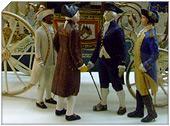Getting Started
Index
NYC Neighborhoods
Manhattan
Brooklyn
Queens
Bronx
Staten Island
NYC Icons
Chrysler Building
Flatiron Building
Empire State Building
Safe NYC
NYPD
FDNY
NYC Weather
NYC Climate
NYC Weather Forecast
Winter Season
Spring Season
summer Season
Fall Season
NYC History & Politics
New York City History
Tammany Hall and Politics
New York City Politicians
New York City Personalities
Culture of Gotham City
Culture of the city
Cultural diversity
City in popular culture
|
James J. Walker, often known as Jimmy Walker and colloquially as Beau James, (June 19, 1881 - November 18, 1946) was the mayor of New York City during the Jazz Age.
Walker was the son of Irish-born William Walker, a Democratic Assemblyman and Alderman from Greenwich Village, belying certain accounts of Walker's childhood which stated he grew up in poverty. Before entering politics, the young Jimmy Walker worked as a songwriter, his most popular composition being "Will You Love Me in December (as you do in May)?".
He attended New York Law School and was elected to the New York State Assembly in 1909, he won election to the New York State Senate in 1914 and was later majority leader of that body, in which capacity he was served by a young Robert Moses. In 1926 he became Mayor of New York City, having defeated incumbent John F. Hylan in the 1925 Democratic primary with the help of Governor Alfred E. Smith and Tammany Hall. The initial years of his mayoralty were a prosperous time for the city, at least partially due to the proliferation of speakeasies during the Prohibition era. His affairs with "chorus girls" were widely known, and he left his wife, Janet, for showgirl Betty Compton without impairing his popularity. He managed to maintain the five-cent subway fare despite a threatened strike.
He won re-election by an overwhelming margin in 1929, defeating Republican Fiorello H. LaGuardia and Socialist Norman Thomas. Walker's fortunes turned downward, with the economy (due to the stock-market crash of 1929). Patrick Cardinal Hayes denounced him, implying the immorality of the mayor, both personal, and political, in tolerating "girlie magazines" and casinos, was a cause of the economic downturn.
Increasing social unrest led to the investigations into corruption within his administration, and he was eventually forced to testify before the investigative committee of Judge Samuel Seabury (the Seabury Commission). Facing pressure from Governor Franklin Delano Roosevelt, Walker resigned from office on September 1, 1932 and promptly fled to Europe until the danger of criminal prosecution appeared remote. There he married Compton.
After his return to the United States, for a time Walker acted as head of Majestic Records. On his death, at the age of 65, in 1946, he was interred in the Gate of Heaven Cemetery in Hawthorne, New York.
A romanticized version of Walker's tenure as mayor was presented in the 1957 film Beau James starring Bob Hope.
|
New York City Search
Quick NYC
|



 New York Weather Forecast
New York Weather Forecast
 Ethnic composition
Ethnic composition


















